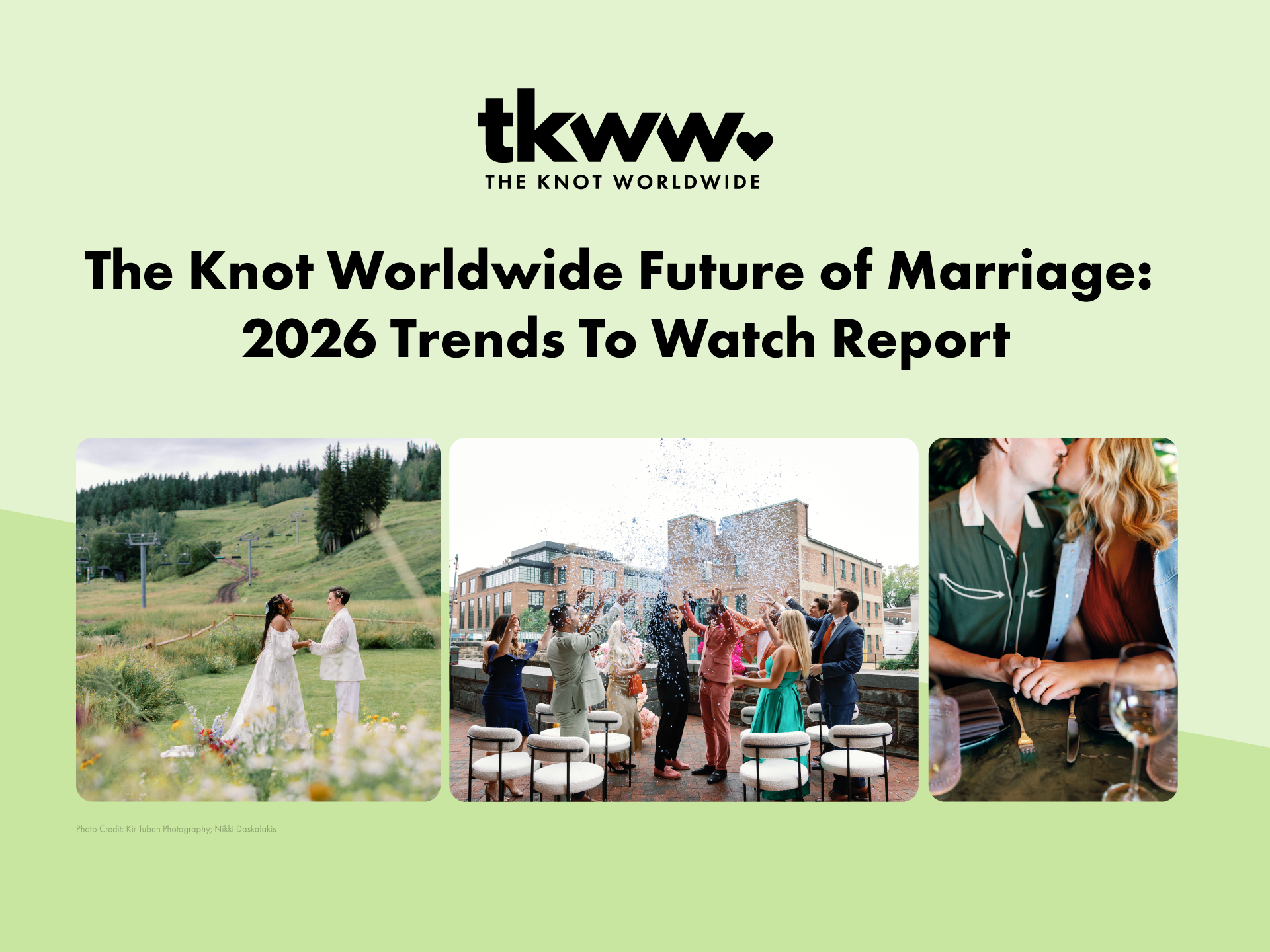The Knot Worldwide Future of Marriage: 2026 Trends To Watch Report
In our second report uncovering how love, culture, and creativity are shaping weddings in the year ahead, we evaluate how couples are balancing the current economic environment, the top influences on wedding spend and style, the use of AI in wedding planning, and what’s on Gen Z’s mind when it comes to marriage.

As we look toward 2026, couples are redefining what it means to celebrate love—balancing the realities of a shifting economy with a continued desire for deeply personal, joy-filled celebrations.
This year’s Future of Marriage: 2026 Trends To Watch Report uncovers how love, culture, and creativity are shaping weddings in the year ahead, as told by engaged couples and Gen Zers still in the dating phase.
How Engaged How Engaged Couples are Balancing Budgets Amid Tariffs
Love may be priceless, but weddings are not immune to today’s economic realities. We surveyed more than 600 engaged couples in the U.S. getting married in 2026, and found that roughly 8 in 10 say the economy has impacted or is expected to impact their planning, with 6 in 10 citing concerns about tariffs specifically. For most, it’s not about spending less — it’s about spending smarter, making thoughtful trade-offs, and reimagining details without compromising the vision for their day.
Four in 10 couples are modifying their plans due to the economy. Thirty-three percent are swapping out flowers or décor, or trimming guest lists by an average of 29 people, while 30% are contacting more vendors to compare prices.
Despite these adjustments, many couples still find the realities of wedding costs challenging: 52% say their initial budget feels lower than the true cost of a wedding. Vendors play a critical role in bridging that gap; 64% of couples say their vendors have helped them stay within budget, highlighting the importance of collaboration and creative problem-solving.

Still, optimism remains high. Eighty-two percent of couples say that amid today’s macroeconomic and sociopolitical uncertainty, they’re looking forward to their wedding day more than anything else next year.
Top Influences on Wedding Spend and Style
In the same survey, we asked engaged couples what cultural elements will shape weddings in 2026.

It’s no surprise that celebrity engagements and weddings ranked among the top influences, landing in third and fourth place, respectively. Weddings are having their red-carpet moment—and these stars are setting the tone for what’s trending.

The Rise of AI
In a separate survey of 228 engaged couples, 36% of respondents reported actively using AI in their wedding planning and 3 in 10 have used image-based AI tools for inspiration or planning. In last year’s 2025 Wedding Trends to Watch Report, we found that only 20% were using AI, pointing to the growing relevance of AI in the industry.

Inside Gen Z’s Mindset on Marriage
We also wanted to gauge how the emerging generation of couples views marriage, so we surveyed 1,004 dating and/or single people in the U.S. between the ages of 18 and 42.
The majority of Gen Z is still a few years away from peak marrying age and is currently focused on other life priorities (such as feeling mentally healthy as well as emotionally and financially secure). Despite not feeling ready for marriage yet, 58% look forward to the day they get married. Gen Z also views marriage less as an important societal and financial institution, with more than 58% seeing it more about choosing and committing to their partner on their own terms. Lastly, despite the expense and stress, nearly half of Gen Zers (45%) say their wedding day is/will be worth investing in.

Enthusiasm extends beyond personal milestones. Sixty-six percent of Gen Zers are enthusiastic about their friends’ weddings, with 39% attending/planning to attend one or more weddings this year.
What’s ‘Out’ for 2026
As we wind down 2025, we also asked both engaged couples, as well as trend-setting single and/or dating Gen Zers, what they predict will go out of style this year.

Conclusion
Looking ahead to 2026, weddings are evolving into celebrations that are as thoughtful as they are joyful. Couples are balancing budgets with big dreams, drawing inspiration from culture and social media, and embracing new approaches to tradition.
For Gen Z, marriage is a milestone that blends personal expression, emotional readiness, and shared excitement with friends and family. The trends we see this year underscore a generation that values authenticity, creativity, and connection above all — proving that the future of marriage is not just about one day of celebration, but a reflection of life lived with intentionality, together.
Methodology
To provide the most comprehensive insights, the findings in this report draw upon data from three distinct proprietary studies conducted by The Knot in late 2025. This research collectively surveyed a wide range of individuals across the U.S., representing diverse geographical locations, ethnicities, income levels, racial groups, ages, sexual orientations, and gender identities. Specifically, the data includes findings from The Knot October 2025 Economic Pulse Study of 600 engaged couples getting married in 2026, The Future of Marriage Study, which includes over 1,000 dating and/or single people aged 18-42, and The Knot AI Study, conducted among roughly 230 engaged couples.